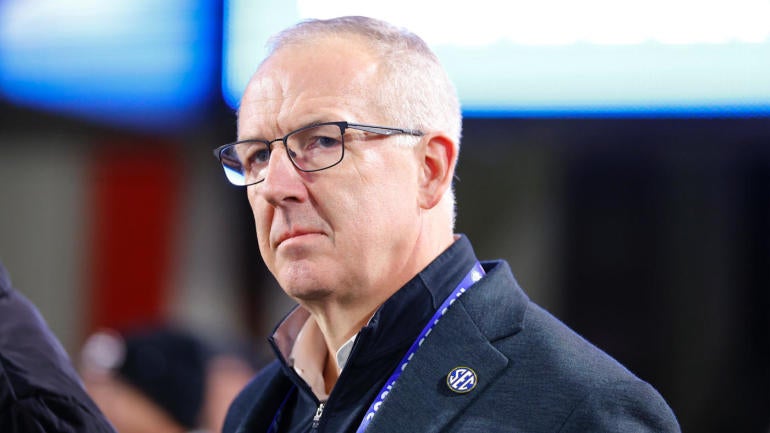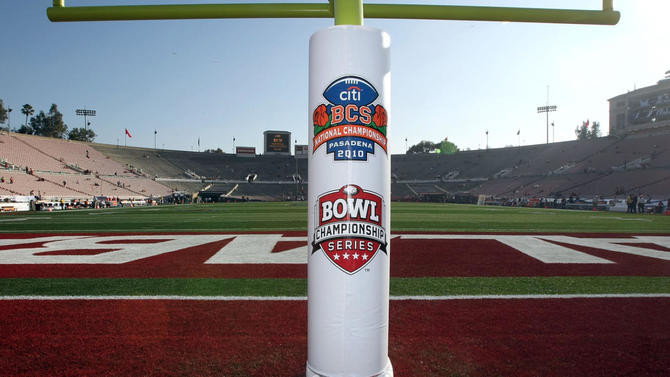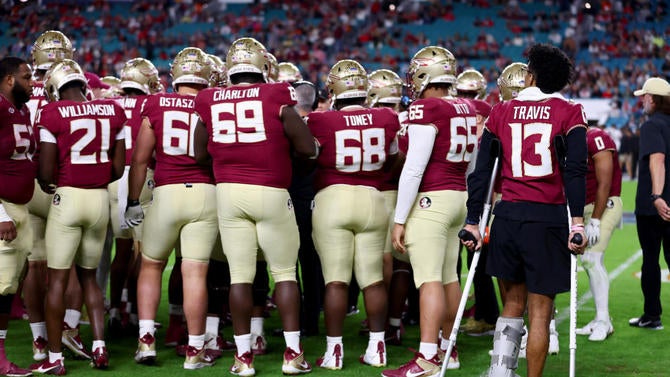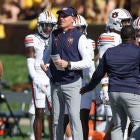
Both the College Football Playoff and the struggle to get in it have never been bigger.
SEC commissioner Greg Sankey laid the groundwork for this year's frantic finish a year ago with his famous "Sesame Street" line as part of a declaration that a playoff without the SEC isn't "the real world of college football."
"One of these things," he said of his teams compared to the FBS rank and file, "is not like the others, and that's the Southeastern Conference."
Tripling the playoff field to 12 has only multiplied and amplified the campaigns to be one of those dozen.
Ole Miss coach Lane Kiffin kicked off the week with a detailed description of why his team should be included. Nowhere did the tweet mention a loss to 4-8 Kentucky, a defeat at four-loss LSU or depressing loss at Florida.
Illinois coach Bret Bielema soon clapped back regarding his own 9-3 program.
Alabama AD Greg Byrne followed with his own slickly produced tweet making the case for the Tide. It conveniently left out reference to debilitating losses at Vanderbilt and Oklahoma and that it is Alabama's first three-loss season since 2010.
Miami sent out a series of tweets bolstering the Canes' case. And, no, there was no evidence among those of blowing a 21-0 lead Saturday at Syracuse.
It has gotten uglier since Tuesday night since Bama seems all but in the playoff after checking in at No. 11 in the penultimate CFP Rankings.
ACC commissioner Jim Phillips is upset that Miami has been marginalized.
Statement from ACC commissioner Jim Phillips on the CFP: "Miami absolutely deserves better from the committee." pic.twitter.com/8N1Y7PyG2H
— Ross Dellenger (@RossDellenger) December 4, 2024
Kiffin lashed out again Tuesday over Miami being ranked a spot ahead of his Rebels, posting on X, "You guys actually meet for days and come up with these rankings?? Do you actually watch the quality of players, teams, and road environments…or just try and make the ACC feel relevant??"
The expanded playoff is coming down to conference affiliation -- mostly ACC vs. SEC -- for the last remaining at-large spots. That conference affiliation is an aspect of its duties the CFP selection committee is supposed to ignore.
Even if all of the above is a bit of mishandled guerilla marketing, the intent of those tweets, and other public comments, was to somehow reach the 13 selection committee members.
"Without any doubt it gets in the minds [of selection committee members]," said Fox analyst Urban Meyer, the former Ohio State and Florida coach. "Now, you've got to be disciplined and do the right thing. But, yeah, absolutely [it does]."
Paola Boivin, a CFP selection committee member from 2017-21, pushed back on that narrative while acknowledging she was aware of all the politicking that took place from invested parties.
"There was always so much noise, whether it was conference commissioners, whether it was pundits, whether it was fans on social media," said Boivin, a professor of journalism at Arizona State. "There's always noise before and after these polls. To me, it just blended in and I honestly didn't think twice about it. I felt very responsible in my job, I handled it very professionally and I think in that room that was the case."
The potential impact of the politicking and campaigning, even from within its own houses, is partly why the SEC and Big Ten have serious concerns about the human element of the committee, according to multiple sources. Even when viewed through a prism of everyone involved is doing their best with good intentions, the committee's inconsistent rankings, both year-to-year as membership turns over and even week-to-week as it selectively decides what to prioritize, highlight the inherent impossibility of the task the members have been assigned. How that process can be improved is being thoroughly examined as part of the Big Ten and SEC's joint efforts -- led by Sankey, SEC deputy commissioner Charlie Hussey, Big Ten commissioner Tony Petitti and deputy commissioner Kerry Kenny -- to reform the College Football Playoff.
The CFP is committed to its current 5 + 7 12-team format (five automatic spots for the highest-rated conference champions and seven at-large spots) through next year's playoff, but the contract allows for format changes starting in 2026.
That could come through automatic qualifiers, as the Big Ten has previously proposed, and only task the selection committee with seeding the teams and not choosing them. In this scenario, the Big Ten and SEC would each get the majority of the automatic qualifiers, three or four per conference, while the ACC and Big 12 would get one or two each, depending on whether the playoff field increases to 14 teams as many within college athletics expect when the current CFP format allows for change in 2026.
One benefit to the automatic qualifying route is it'd eliminate the current whining about whether tough scheduling is rewarded. South Carolina coach Shane Beamer complained Wednesday that "The committee made it very clear that they really don't give a hoot who you beat. Just don't lose three times." If each conference's AQ rules decide which teams make the playoff, scheduling a tough non-conference opponent like South Carolina's annual game against Clemson could benefit on seeding but not prevent a team from making the field.
Or the CFP could, as some SEC sources have suggested, be as bold as eliminating the committee altogether and returning to something akin to a revamped BCS (Bowl Championship Series) computer model that takes human subjectivity out of it. In this scenario there could be zero automatic qualifiers and no maximum on the amount of teams a conference would get into the field. The SEC has long taken the stance, publicly and privately, that it doesn't feel it needs automatic qualifiers and would benefit from an open format.
It boils down to the sentiment, among those familiar with the conferences' line of thinking, being that conferences do not trust the selection committee and would like to find away to take away its power.
CFP officials continue to stress the objectivity of the committee. Members have to recuse themselves from the discussion if their alma mater is involved. However, conference affiliation does not disqualify members from weighing in.
In fact, this year's chair is from the Big Ten, Michigan AD Warde Manuel. He doesn't have to worry about his team but he works within a league that would like to see a move toward automatic qualifier spots beginning as early as 2026.
"Subconsciously, [subjectivity] things are there and you can't change that ...," said former Big East commissioner Mike Tranghese, a member of that first selection committee in 2014. "They said, 'We want to get the best teams.' But no one told us how to find the best teams."
For a decade now, CFP worthiness has been a moving target. Mostly, the so-called "right" teams have made it in. But this first year of the 12-team field has ramped up the anxiety over access to the playoff's billions.
The Big Ten and SEC have already gotten a bigger share of CFP revenue and fixing the selection process is a priority moving forward. Sources within both conferences shared frustration over past committee decisions with the four-team field and even, at times, near-bad decisions that signaled to some that the committee makeup needed changes. There is not much faith in the room to get it right from the sport's most powerful conferences especially as the job became more challenging with this year's 12-team format.
In October during a historic meeting of the two conference's leaders and athletic directors in Nashville, Sankey bluntly stated the 12-team playoff "just has to go incredibly well." Petitti, his Big Ten counterpart, was on the same wavelength and said "I want to see the selection process, how it works, how the seeding works, how they evaluate and compare teams." There is expected to be greater discussion with committee members and conference leaders after this season concludes to discuss what did and didn't go incredibly well.
If the CFP moved to more automatic qualifiers, historical track record justifies the Big Ten and SEC gobbling up the majority of the playoff spots.
Since the BCS started in 1998, the SEC and Big Ten have combined to occupy 113 of the 184 of total BCS/CFP spots (62%). If the two leagues each get four teams in the first expanded bracket they would combine for 66% of the field.

Perhaps most fascinating about the Big Ten and SEC's concerns with the selection process is, on paper at least, neither conference could claim to be the most aggrieved party of the committee's decisions. Phillips and his two Florida-based schools, Florida State and Miami, would lay claim to that unfortunate honor.
In the history of both the BCS and the CFP, the SEC -- particularly Alabama -- had received every benefit of the doubt from the computers and human selectors. Twice the Tide played for a championship (2011 and 2018) without so much as winning its division. One former committee member pushed back on any Bama bias, citing how the team's speed, strength and other characteristics allowed the Crimson Tide to stand out when comparing against other teams side-by-side.
But the narrative cranked up again Tuesday night. Alabama, in the middle of its worst season since 2010, appeared ahead of contenders No. 12 Miami, No. 13 Ole Miss and No. 14 South Carolina.
The SEC didn't totally get its way given the complaints from Kiffin and Beamer but it looks headed for a total four participants in the first expanded playoff come Selection Sunday.
The SEC has those three 9-3 teams whose regular seasons are completed -- No. 11 Alabama, No. 13 Ole Miss and No. 14 South Carolina. That three-loss SEC field could grow to four if Georgia (10-2) loses to Texas in the SEC Championship Game.
Those schools will in some way be compared to ACC teams for the final at-large spots -- either SMU (11-1) or Clemson (9-3) or Miami (10-2). The Mustangs and Tigers play Saturday in the ACC Championship Game.
Clemson has to win.
SMU may have to.
Miami is out.
Miami AD Dan Radakovich, a former CFP selection committee member, was understandably upset.
Really ?? ….what put Bama over the top of Miami for the last spot in is that Miami went 1-2 in their last 3 games (by an average of 4.5 pts, to a ranked Syracuse and GT team that just took UGA to 8OT). Bama went 2-1 (to 5-7 Auburn, destroyed by OU, and beat FCS Mercer)
— Dan Radakovich (@DanRadakovich) December 4, 2024
Depending on how this weekend's games go, the SEC will either have four teams in the CFP compared to the ACC's one. Or the SEC will have three teams and the ACC will have two.
That's where worlds would collide. That particular outcome would not be a good look for Sesame Street.
"That's just up to them and their integrity to push that [subjectivity] aside," CFP executive director Rich Clark said this week of the selection committee. "It's incumbent upon each of the committee members to not allow conference affiliations to interfere with their judgement."
Meyer, who won national titles at Florida and Ohio State, accurately pointed out the Big Ten is more top heavy this season as it is in most years. No. 1 Oregon, No. 3 Penn State and No. 6 Ohio State have dominated in the first year of the 18-team league.
The difference at the top is the parity in the SEC. There were no undefeated teams after Halloween. There are currently nine teams with four losses or fewer.
"I've lived in that SEC world," Meyer said. "With all respect to those other conferences, there's nothing like that one, now. Top to bottom the cannibalism. It's week in, week out."
CBS Sports expert bracketologist Jerry Palm doesn't believe the public campaigning has any impact on the actual field.
"They aren't telling the committee something they don't already know, if the committee sees it at all," Palm said. "They certainly aren't thinking 'Oh my God! Lane is right! We are totally underrating them. Thank goodness for the brand new information.' "
As distasteful as it sounds, this has become the schools and conferences version of flag planting. Everybody is carving out a piece of turf.
The same measuring sticks still apply. CFP protocols haven't changed:
Championships won
Strength of schedule
Head-to-head
Outcomes against common opponents
Little of that applied to Florida State last year when it became the second ever undefeated power conference champion not to play for a championship. FSU, 13-0 at the time, was without its injured starting quarterback Jordan Travis.
That might have marked the biggest controversy in the CFP's history. At least one committee member told CBS Sports that person didn't think Florida State could win the national championship without Travis.
Teams' ability to win a national championship is not supposed to be one of the considerations.
"Tell me who you don't want to play," Tranghese said relaying a key discussion within the room. "You've got to operate in a vacuum and pick the best teams. Make sure there is a healthy discussion about strength of schedule."

You can already anticipate a bigger controversy than FSU. Inside the Miami football facility they were livid Tuesday night that Alabama had gotten the advantage.
The Hurricanes finished 6-2 against bowl eligible teams. Alabama was 6-3 in that category. Alabama had two bad losses against six-loss teams in the Commodores and Sooners. Miami lost for a second time Saturday by four on the road to an 8-3 team (Syracuse).
Alabama has that win over No. 5 Georgia which has already lost twice and not been particularly impressive lately.
"It's simple, how do you keep [those SEC teams] out?" a head coach outside the SEC said sarcastically. "They've lost three times."
In defending Tuesday's ranking, Manuel cited Alabama's 3-1 record against top 25 opponents while Miami finished 0-1.
Is there a team being left out that doesn't make it a credible playoff?
"I don't think there is [such a team]," Meyer said. "There certainly is a street fight."
That reflects the national reaction. Alabama wasn't the obvious choice to be in. Miami wasn't an obvious choice to be left out. Logic and history would dictate teams that have finished playing should remain in their Tuesday spot relative to each other on Selection Sunday.
CBS Sports asked Clark about a phenomenon that didn't exist when the field was expanded to 12. Realignment has now consolidated teams to the point they don't play half the opponents in their leagues.
That might help explain why Texas, Oregon, Arizona State and SMU all got to their championship games in their first year in those leagues.
"It's very interesting," Clark said. "You have teams from the same conference that have completely different schedules. It used to be you'd expect they'd have a lot of common opponents.
"That is an interesting phenomenon but I think the committee can still overcome that."
In Year 1 of the CFP, former secretary of state Condoleezza Rice suggested fellow selection committee members hang hats on a hat rack before they entered the meeting room. Symbolically, that was supposed to represent they left their biases behind.
"That's an indication to people who you work for, where you played, what league you're maybe tied to … that's irrelevant to the game of football. We're picking the best 25 regardless," Manuel said.
"This year it hasn't come up that somebody is speaking in a way that would indicate they're [favoring a league]."
But since that first year, entire networks have emerged to lobby for conferences. Nick Saban himself, as a coach and a commentator, has become an influential voice.
It was Saban who famously went on GameDay in 2011 to lobby for Alabama in the BCS. Despite losing head-to-head to LSU in the regular season, the Tide were able to get back and win the rematch for the national championship.
Now he is more of a national voice as an ESPN analyst.
"Now you've got the discussion, is it really worth going to a championship game?" said former West Virginia AD Oliver Luck, a member of that first selection committee.
We'll see if Georgia loses for a third time (vs. Texas in the SEC game), or if SMU loses for a second time (vs. Clemson in the ACC game). Both the Dawgs and Mustangs could be in danger of being left out after having to play that extra game.
"Potentially, yes," Manuel said Tuesday night about SMU dropping below Alabama if it loses on Saturday.
If nothing else, the social media/TV/streaming campaigning plays to the base. At some point there will be an assessment not whether a school/coach is doing enough to make their case.
Kiffin made the biggest impact on Monday right out of the box.
"I look at some social media. I take it for what it's worth," Clark said. "I understand it but in the end I can't let that impact us."
















